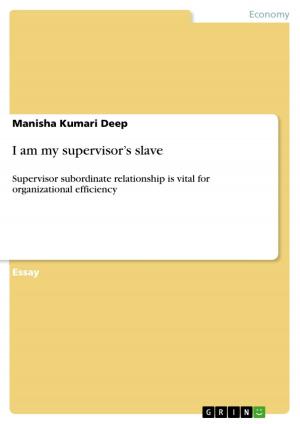Leaders' Qualifications in the Logistics Industry - Are there differences between the requirements for leaders depending on their culture?
Are there differences between the requirements for leaders depending on their culture?
Business & Finance, Management & Leadership, Management| Author: | Andreas Mothes, Heiko Ulrich, Daniela Kramer | ISBN: | 9783638523868 |
| Publisher: | GRIN Publishing | Publication: | July 19, 2006 |
| Imprint: | GRIN Publishing | Language: | English |
| Author: | Andreas Mothes, Heiko Ulrich, Daniela Kramer |
| ISBN: | 9783638523868 |
| Publisher: | GRIN Publishing |
| Publication: | July 19, 2006 |
| Imprint: | GRIN Publishing |
| Language: | English |
Bachelor Thesis from the year 2006 in the subject Business economics - Business Management, Corporate Governance, grade: 1,0 (A), Mid Sweden University, 34 entries in the bibliography, language: English, abstract: During the last decades two factors had a great influence on organisations: First the development of computers and second the globalisation. With computers the relative importance of information increased rapidly compared with other resources as ownership of land, materials or work. Globalisation might be seen as a consequence of the developments in computer sciences but the changing of political systems with the opening of borders also had a great impact on this progress. [Cle2004, p. 19f] In Europe the globalisation process was intensified by the political changes and the enlargement of the European Union. As one effect, business relations are getting more and more international. Not only do the big global players act on different markets but they also use smaller markets outside their home country to develop their business. The internationalisation process leads to a greater shipping volume of goods and to more specific transport concepts such as cross-border and just-in-time delivery. Hence, the transport industry is heavily infected by international business relations and the all-embracing supply chains rely on the operativeness of the logistics. The problems concerning the transportation are not only the longer distances and the smaller time windows but also cultural based reasons. Working with people from different cultural backgrounds might lead to misunderstandings and conflicts. The problems derived from the internationalisation process might not be so dramatic on the workers' level but more intensive on the leaders' one as they need to interact with people having another cultural background. Therefore the qualifications of leaders in the logistics industry should include intercultural and international competences. The question remains whether it is so easy to change from one employer to another with the perspective on the employers' requirements. Has globalisation affected the qualifications for jobs in a similar manner as it influenced the dealing with information and goods? If the requirements of employers vary between different countries it can be assumed that it will be difficult for employees to meet these requirements abroad and to get an appropriate job there according to the importance of competences mentioned. [...]
Bachelor Thesis from the year 2006 in the subject Business economics - Business Management, Corporate Governance, grade: 1,0 (A), Mid Sweden University, 34 entries in the bibliography, language: English, abstract: During the last decades two factors had a great influence on organisations: First the development of computers and second the globalisation. With computers the relative importance of information increased rapidly compared with other resources as ownership of land, materials or work. Globalisation might be seen as a consequence of the developments in computer sciences but the changing of political systems with the opening of borders also had a great impact on this progress. [Cle2004, p. 19f] In Europe the globalisation process was intensified by the political changes and the enlargement of the European Union. As one effect, business relations are getting more and more international. Not only do the big global players act on different markets but they also use smaller markets outside their home country to develop their business. The internationalisation process leads to a greater shipping volume of goods and to more specific transport concepts such as cross-border and just-in-time delivery. Hence, the transport industry is heavily infected by international business relations and the all-embracing supply chains rely on the operativeness of the logistics. The problems concerning the transportation are not only the longer distances and the smaller time windows but also cultural based reasons. Working with people from different cultural backgrounds might lead to misunderstandings and conflicts. The problems derived from the internationalisation process might not be so dramatic on the workers' level but more intensive on the leaders' one as they need to interact with people having another cultural background. Therefore the qualifications of leaders in the logistics industry should include intercultural and international competences. The question remains whether it is so easy to change from one employer to another with the perspective on the employers' requirements. Has globalisation affected the qualifications for jobs in a similar manner as it influenced the dealing with information and goods? If the requirements of employers vary between different countries it can be assumed that it will be difficult for employees to meet these requirements abroad and to get an appropriate job there according to the importance of competences mentioned. [...]















